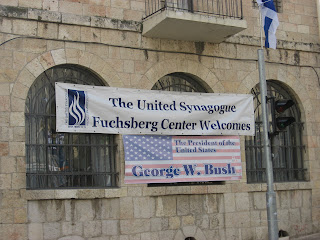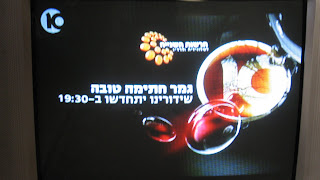A year back home, a year away from home.

It's just a year and a few days past our leaving Jerusalem. The questions we get are as varied as you might expect. "Do you miss it?" Yes we do- but not everything about living in Jerusalem. Money can't buy everything, but being poor is no mechaiya either. "Do you want to go back?" Yes, but just not right this instant. "Was it hard to re-adjust?" No, not really. Jerusalem life is city life, and so is our life here. "What do you miss most" is a terrible question to answer. There are so many things that are precious to us from our two years, although we do have an answer for what is #1, and the place/person/people/food/substance/site in question knows how we feel about it. At least, we hope they do.
Yes, the places and sites are missed, and the food is something we pine for, but the people, Dear Lord, the people are what we miss the most. Friends and teachers and program people and so many others, to have them fade out of our lives is painful. The two years may have been low on cash, but we came into the lives of so many people, and so many people came into our home. Homes. Two apartments and two schools and a hundred other places in the Holy City. How can you meet so many people who step into your life as if they always were part of it, and not feel their absence when you part ways?
Being a more cynical person than most would believe, the question that haunts me the most is "Was it worth it?" I lost gainful employment I have yet to replace; and while my lady love is employed, I can't say "Yes!" with true and furious clarity. My Hebrew did not become fluent; I still can't follow the Israeli news or read "Ha'aretz" in Hebrew. Israelis on the streets here still speak too fast for me to follow. I still can't read a page of Talmud in the Vilna format, let alone understand Tosfot. I never met martial arts master Yehoshua Sofer. I never walked on the Temple Mount (that is, the parts my Rosh Yeshvia said were permitted). And there are two years worth of savings that are not in our accounts that would have been very comforting to have in this economy. There are lots of "didn'ts" and "nevers" and "couldn'ts" hovering behind me from those two years. Yes, it's haunting, and yes, it's damned annoying.
But those "didn'ts" and "nevers" and "couldn'ts" don't haunt me unopposed. There are angels of better memories that remind me that the year was not without triumphs and joys. I can't read the page of talmud like I wish I could- but I can read it better than I used to. Hebrew, likewise, is not where I want it, but its not as utterly awful when it comes out of my mouth in years past. I learned about new foods and saw amazing sights (excluding the Bahai gardens in Haifa, which were closed on the day we visited) and got to be a student again just for the hell of it. We brought back books, a few gifts, and a good deal of learning. And the people we met, my oh my.... the people. If we had not gone, we would never had met so many people who amaze us, who make us laugh, who love us and care for us and whom we adore. The "didn'ts" and "nevers" and "couldn'ts" aren't dispelled in the face of their friendship and love, but they cower back into the shadows when those faces of friends and teachers come near.
So the view from the 11th floor after a year? A bit clearer, with the dawning suspicion that some experiences in life can't be evaluated without time, and some choices in the past are harder to evaluate when the future is in doubt. But I mark this moment in time with a thought that supported me and put me in a thankful state of wonder day after day in Jerusalem. There is a legend in my family that we came to Sloka, Latvia from Herschberg in southern Germany in the 15th or 16th centuries. The legend notes that the family came looking for a better life to Germany from Bavel in the 10th century, when the community of Jews there had gone into decline after so many generations. The Jews of Bavel, of course, had originally come from Jerusalem as exiles, weeping on the shores of her rivers.
What made me worthy to be the one to bring the family legend full circle, to be the Jew who lived in Jerusalem once again after so many generations? What did I do that made me more worthy than my Great-Grandfather, who somehow had the wisdom to leave Lativa when he did,
 learning American English from a custodian he worked with? How was I more worthy than my Grandfather, who came to America at the age of 10, took care of his 7 siblings and raised 3 children, was a lover of the Shul and Bies Midrash? Or my father, who bucked the trend and visited Israel as a struggling state in '63 but never got to visit it these days of the Kotel and the Light Rail and Kosher Sushi? How did I merit to be the one? I have no idea, but I am thankful for having parents who helped me be the one who did go, and am thankful for each day I had in Jerusalem.
learning American English from a custodian he worked with? How was I more worthy than my Grandfather, who came to America at the age of 10, took care of his 7 siblings and raised 3 children, was a lover of the Shul and Bies Midrash? Or my father, who bucked the trend and visited Israel as a struggling state in '63 but never got to visit it these days of the Kotel and the Light Rail and Kosher Sushi? How did I merit to be the one? I have no idea, but I am thankful for having parents who helped me be the one who did go, and am thankful for each day I had in Jerusalem. Revisiting the view from the 11th floor is enlightening- and it shows that the two years were probably all worth it, despite the troubles and rough spots. After all, how often do you get to overturn exile, tragedy, and the darkest parts of history, just by living in a city, albeit one reborn from rubble and ruin?
In memory of my father, Binyamin Velvel Ben Meir, and his father, Meir ben Moshe.


























